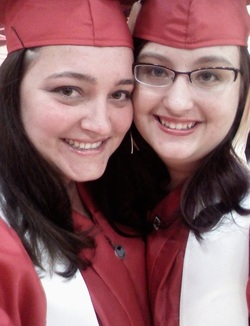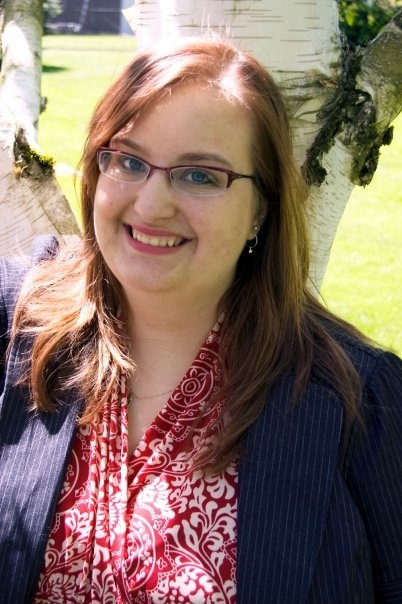
As and assignment for a class, I had to write a personal philosophy of adult education. It really made me sit down and think. Anyhow, I figured it would be a great first blog post, so here it is.
Also, this photo is the only one from graduation (in 2009) that I actually like, so I hope my friend Mel, doesn't mind.
Personal Philosophy
A personal philosophy for Adult Education is very important to have written down. Your personal philosophy is what guides the way you create and present in every aspect of your work. If you don’t have a road map, you may not wind up where you want to be. It’s important to check in with your philosophy, to remind yourself why you are doing this, and what you value, otherwise burn out and laziness can cause you to stray to what is easy, rather than what is right.
I believe strongly that good education involves 3 things. First, that everyone comes to the table with different experiences, and those experience not only shape how that students learn, but they are also valuable to the other co-learners. Second, that while it’s important for an instructor/facilitator to have a lot of preparation and planning for every class, it is also very important to leave room and have flexibility for student driven exploration. And three, mixing things up, and incorporating different types of activities will help keep your participants engaged, and maximize the experience for all of those involved.
If you have an understanding of Constructivist Learning Theory and Social Cognitive Learning Theory, you will see that I pull a lot of this from those philosophies. If people construct meaning based on their own experiences, which is an inescapable with adult learners, then their experiences are valuable. Because of this, I think that small group discussions, personal reflection, group work, and sharing are important parts of learning. As a human, you are more likely to get meaning out of a lesson if you can attach it to something meaningful to you, and the human experience is based on our relationship with others.
It is also important to remember, that every adult learner is seeking knowledge for a reason. In most situations it is important to provide certain information, however providing the experience that the learner is seeking is equally important. Otherwise, what is the point? This is why it is important to have expected outcomes and plans on how to get there (in fact, I think that you should always plan more material than you think you need), but allow for students to direct the learning when appropriate. Underneath adult education is the goal to impart valuable knowledge or experience onto the participants, but only the participant knows what is the most relevant for themselves.
As an adult learner myself, I know that the plain lecture only classes are the most difficult for me to engage in, so why would I do that as an educator myself? However, I also recognize that not everyone enjoys things like role plays, group work, student presentation, or discussions. This is why I feel it is important to mix it up. Use a bunch of different types of activities, so everyone will get something they like and maybe a couple of things that are a little uncomfortable. I think the it is important to push people a little bit so they can gain experience and possibly push the boundaries of their world, but not so much to have them shut down, which will not allow them to gain anything from the experience.
By embracing these three principals, and allowing room for growth in my philosophy, I hope to be an effective instructor/facilitator. By having a written philosophy, I have a living document to refer to, which will allow me to edit and change, as I learn and grow.
Also, this photo is the only one from graduation (in 2009) that I actually like, so I hope my friend Mel, doesn't mind.
Personal Philosophy
A personal philosophy for Adult Education is very important to have written down. Your personal philosophy is what guides the way you create and present in every aspect of your work. If you don’t have a road map, you may not wind up where you want to be. It’s important to check in with your philosophy, to remind yourself why you are doing this, and what you value, otherwise burn out and laziness can cause you to stray to what is easy, rather than what is right.
I believe strongly that good education involves 3 things. First, that everyone comes to the table with different experiences, and those experience not only shape how that students learn, but they are also valuable to the other co-learners. Second, that while it’s important for an instructor/facilitator to have a lot of preparation and planning for every class, it is also very important to leave room and have flexibility for student driven exploration. And three, mixing things up, and incorporating different types of activities will help keep your participants engaged, and maximize the experience for all of those involved.
If you have an understanding of Constructivist Learning Theory and Social Cognitive Learning Theory, you will see that I pull a lot of this from those philosophies. If people construct meaning based on their own experiences, which is an inescapable with adult learners, then their experiences are valuable. Because of this, I think that small group discussions, personal reflection, group work, and sharing are important parts of learning. As a human, you are more likely to get meaning out of a lesson if you can attach it to something meaningful to you, and the human experience is based on our relationship with others.
It is also important to remember, that every adult learner is seeking knowledge for a reason. In most situations it is important to provide certain information, however providing the experience that the learner is seeking is equally important. Otherwise, what is the point? This is why it is important to have expected outcomes and plans on how to get there (in fact, I think that you should always plan more material than you think you need), but allow for students to direct the learning when appropriate. Underneath adult education is the goal to impart valuable knowledge or experience onto the participants, but only the participant knows what is the most relevant for themselves.
As an adult learner myself, I know that the plain lecture only classes are the most difficult for me to engage in, so why would I do that as an educator myself? However, I also recognize that not everyone enjoys things like role plays, group work, student presentation, or discussions. This is why I feel it is important to mix it up. Use a bunch of different types of activities, so everyone will get something they like and maybe a couple of things that are a little uncomfortable. I think the it is important to push people a little bit so they can gain experience and possibly push the boundaries of their world, but not so much to have them shut down, which will not allow them to gain anything from the experience.
By embracing these three principals, and allowing room for growth in my philosophy, I hope to be an effective instructor/facilitator. By having a written philosophy, I have a living document to refer to, which will allow me to edit and change, as I learn and grow.

 RSS Feed
RSS Feed